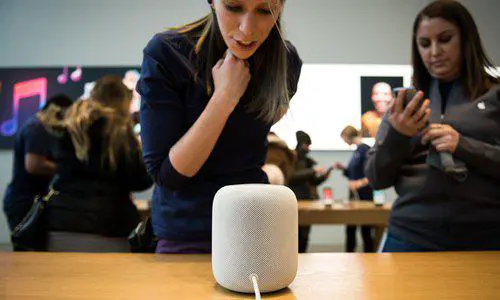Apple Inc is scheduled to launch its HomePod smart speaker in China on Friday, a move that an analyst said shows the US-based company wants to use smart home appliances to win back some Chinese customers amid plummeting sales of its star iPhones.
The wireless speaker, which is already available in countries like the US, UK, Australia, Canada and France, will sell for 2,799 yuan ($413) in the Chinese mainland and HK$2,799 ($356) in Hong Kong in white and space gray.
"Can't wait for our customers in China to experience their favorite music on HomePod," Apple CEO Tim Cook said on his twitter-like Weibo account on Monday.
"I'm curious about the new product from Apple, but I won't rush to buy it because of its high price among many other choices in the Chinese market," a Beijing resident surnamed Guo told the Global Times on Tuesday.
"Apple's HomePod is aimed at its fans, because it's more expensive than domestic brands," Xiao Fei, an industry analyst at Beijing-based consultancy Analysys, told the Global Times on Tuesday.
Xiao said that the smart speaker market in China features many brands competing with low prices and Apple will feel pressure from local rivals in this regard. Baidu's smart speaker Xiaoduzaijia is 349 yuan on its website dumall.baidu.com. Xiaomi's products cost between 269 and 599 yuan on the website mi.com.
"Factors such as operating systems, design and artificial intelligence technology will support HomePod's pricing," Xiao said.
After Amazon first tapped the sector by unveiling its smart speaker Echo in 2014, China's JD.com Inc introduced the country's first homegrown smart speaker, Diongdong, in 2015.
During the past three years, the domestic smart speaker sector saw a boost as many Chinese companies such as Alibaba, Xiaomi, Baidu and iFlytek Co poured into the market.
Smart speaker shipments in China hit 5.8 million units in the third quarter of 2018, up 1 percent quarter-on-quarter, according to industry consultancy Canalys.
Alibaba secured the first-place position in the third quarter, shipping 2.2 million Tmall Genie smart speakers, although this was down 26 percent on a quarterly basis. It was followed by Xiaomi and Baidu, with shipments of 1.9 million and 1.0 million units, respectively, Canalys figures showed.
Apple is seeking a new growth driver in the form of smart home appliances to further expand in the Chinese market, according to Xiao. Apple lowered its revenue expectations on January 2 for the first time in 16 years due to poor iPhone sales.
(GLOBAL TIMES)
 简体中文
简体中文

